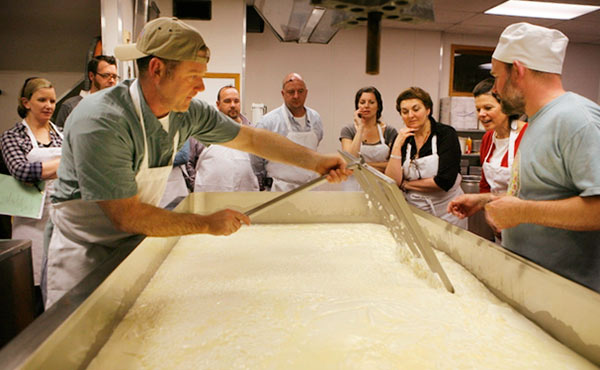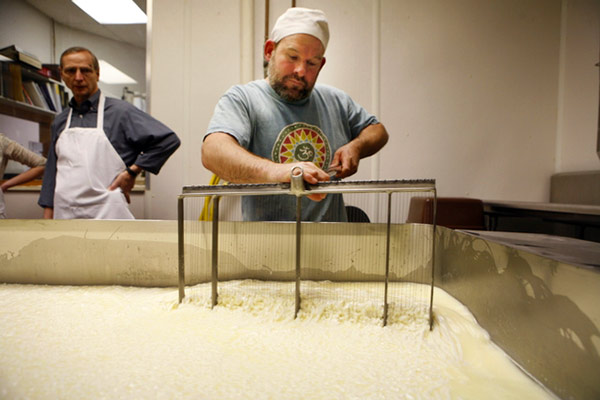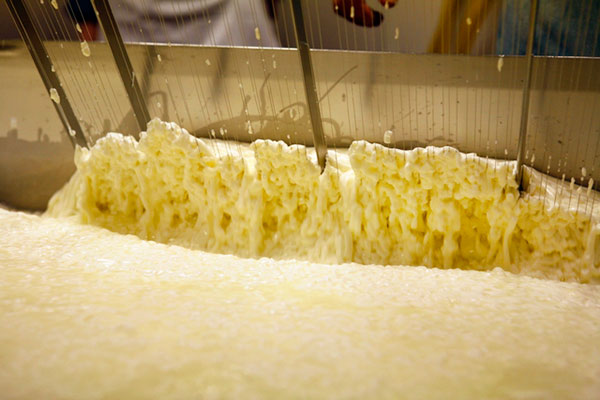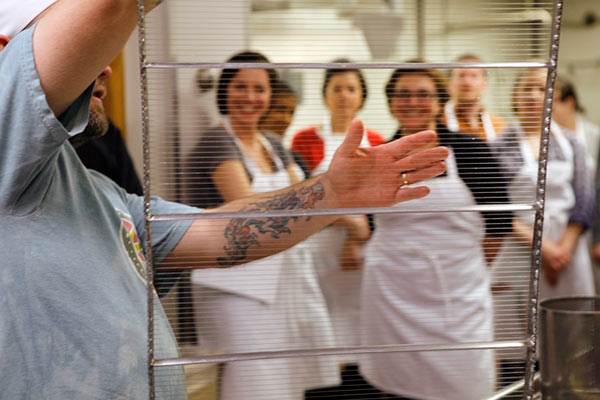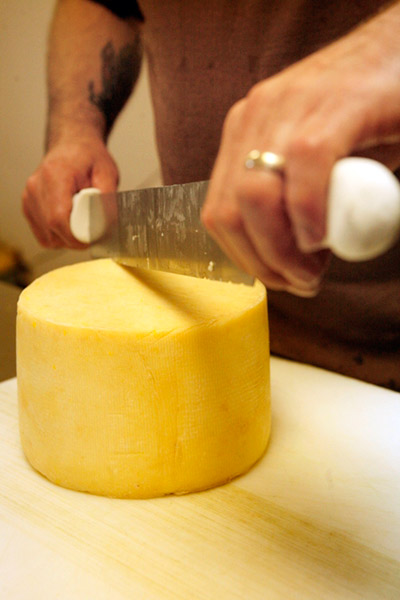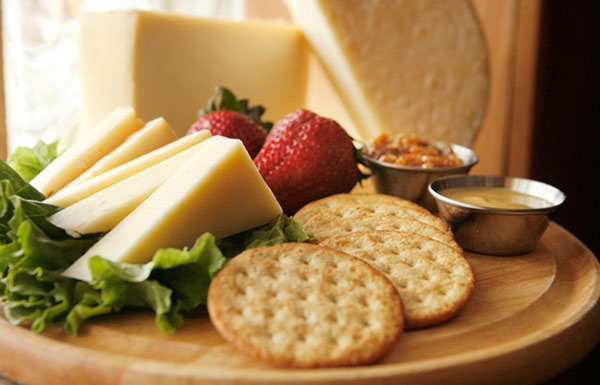Made in Midtown: Traffic Jam & Snug’s cheese stands alone
When 3,000 gallons of milk enter the kitchen at the corner of Canfield and Second, something magical happens. With a mix of science, art, and TLC, Traffic Jam & Snug makes amazing raw milk, artisinal cheeses. We got to watch, learn and taste.
Chris Reilly knows his Asiago is really best after six months, but he can hardly make it fast enough to keep it around that long.
“I can’t keep up. It’s gone before it’s at its peak,” says Reilly, head cheese maker and brewmaster at Traffic Jam & Snug in Midtown. Artisinal cheese making, he says, is going to get huge. “It’s the next thing. It’s the next craft beer movement.”
It might be the “it” thing among foodies, but batch-made cheese has been a staple for decades at the Midtown restaurant.
It’s a spring Saturday afternoon, and Reilly and Scott Lowell, a real estate developer and owner of Traffic Jam & Snug, have gathered 15 lucky people for the restaurant’s inaugural cheese-making workshop. This is the 45-year-old restaurant’s first workshop, and Lowell and Reilly are pulling out all of the stops — with hands-on curd cutting and hooping, ample samplings of cheese, beer and other goodies, and lots of storytelling.
The workshop, truth be told, really is less of a do-it-yourself event and more of an educational and gastronomical opportunity. Cheese-making can be quite complex. Although Reilly and Lowell offer tips for doing it yourself, after the workshop only a couple attendees, including yours truly, leave saying they’ll try this at home.
Still, for the foodies, locavores and just curious customers in attendance, this is a golden ticket to see up close how Traffic Jam makes its cheese.
Raw and uncensored
So, golden tickets in hand, we begin the process in what was the parlor of the 1880s home at the corner of Canfield and Second. The original owners would be floored, I’d guess, to see that it has become a commercial kitchen, serving as the beer, ice cream and cheese facility for TJ’s, as its loyal fans call the restaurant.
Really, though, the process starts the day before about 45 miles north on a farm in Ortonville. The cows at Cook’s Farm Dairy offer up 3,000 gallons of raw, unpasteurized milk. In the morning, a truck makes its way south to Detroit, an hour-long trek, and stops at the quaint restaurant on the corner of Canfield and Second.
Lowell says TJ’s only gets its milk from Cook’s, and they only get their milk from their own cows. “We’ve been to the farm. We can see how they run their operation. And they run a very nice operation over there,” says Lowell.
Lowell says the very best cheese is made with raw milk, because the pasteurization process “beats the shit out of the fat particles” (that’s the technical term for it, he says), and those particles are what make cheese really yummy.
Reilly says that raw milk has more health benefits than pasteurized. He says all the good-for-you bacteria that companies are trying to add back into food — calling them probiotics — are naturally found in raw milk. The debate is played out all over the Internet, and the FDA would likely disagree. Do note the FDA has cautions for pregnant women and the elderly about consuming raw milk. Lowell says the key to keeping it safe, as with any food product, is to follow dairy regulations and know your source, which he does.
Curds and whey
Reilly meets the truck, which pumps the 3,000 gallons into a huge stainless steel vat. In comparison, an average bathtub holds about 40 gallons. When he’s done working his magic which, when he describes it sounds like a lot of science mixed with art and luck, all that milk is going to become cheese, glorious cheese.
Reilly and Lowell give the group detailed lessons. We hear about cheese composition (87.8 percent water, who knew?). “Think of milk not as a liquid but as a colloidal suspension,” Reilly tells us. We apparently learned that term in high school science. Um, sure. I will Google that later.
Reilly goes on to teach us about starter cultures and rennet, lactic acid and enzymes. Lowell talks about the facility and the equipment, which also do duty for the restaurant’s brewing and ice cream making. He says TJ’s is lucky to be in Detroit, because the city’s steam service pipes right into the boilers.
We watch as the rennet goes in and the curds start to form. And then we watch as Reilly uses grid-like cutting tools to slice the thickening stew into little tiny squeaky-on-the-tooth curds. Once the curd has been separated from the liquid whey, we put our hairnets and gloves and scoop curds into bins to schlep them from the vat to a table of waiting hoops. The hoops are circles of metal with tiny holes in the side, like a colander, which allow the liquid to leach out as the cheese forms.
Mold is also needed to make this batch of curds into an Asiago — and not the dry lifeless Asiago you may know from the grocery store, thank you very much. This Asiago will be softer and its flavor more intense. You would slice this to serve with wine and good bread; you would not grate it like a Parmesan.
In the end, that vat of 3,000 gallons of milk is going to net about 300 pounds of cheese. It’ll take a couple months before our cheese is ready. Really six months would be best, Reilly reminds us. Sometimes he takes the Asiago into the restaurant’s blue cheese-only cooler, where the blue mold is so vigorous it’ll take over whatever cheese is introduced. Traffic Jam’s aged Asiago is divine, but the blue Asiago is out of this world.
When all 300 pounds are hooped, we get to leave the workroom. It’s time to sample more cheese and TJ’s beer, including its newly tapped Owosso wheat, which uses grains the bartender says were grown at his family’s farm.
While we lounge, Reilly, however, has more work to do. The hooped cheeses need to be flipped again in an hour. And he’ll have to come back Sunday, after church, to take them out of the hoops. They’ll also need to be rubbed with salt and turned over daily for a week. And then they need to spend a couple months in the cooler. Reilly talks of science and art, but you can tell there’s love for what he does, too. And you can’t hurry that.
Traffic Jam & Snug uses its homemade cheese, beer and baked goods in the restaurant. You can also buy the cheese — including the Asiago varieties — and bakery items to take home. Or find them at a local farmer’s markets, including Eastern Market on Saturdays, Royal Oak on Fridays, plus markets in the city of Wayne and Novi.
The restaurant will host its first ever beer-making workshop this weekend. If you are interested in making a Dubbel Wit beer, join them from 10 a.m. – 4 p.m. Saturday, May 15. “There will be more drinking with this one,” Lowell says. The brewing class is $60 per person and includes a continental breakfast, a lunch with beer, an “after-work” cheese and beer-tasting in the bar, and a growler of beer (with a free refill of the brew made that day, upon return after June 3). There are only 12 spots available and reservations and payment should be made in advance by e-mailing tjsnug@traffic-jam.com.
Clare Pfeiffer Ramsey is Model D’s editor. Send feedback here
